Be sure to stay in touch about upcoming events by signing up for our email newsletter here!
- Passover Learning and Action

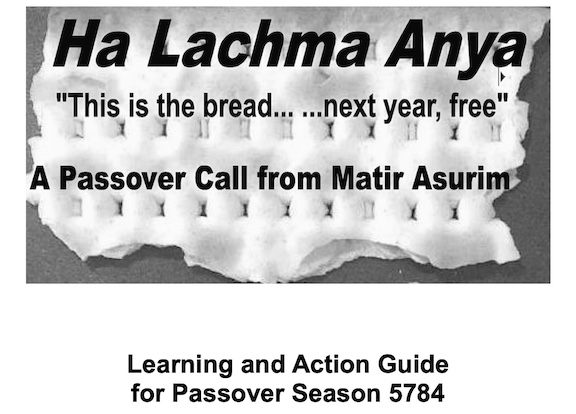
Resources for individuals and Jewish groups to pursue, before, during, and following Passover to spur attention within Jewish communities to the needs of incarcerated Jews and those around them in Canadian and US carceral systems.
Download Ha Lachma Anya: A Passover Call from Matir Asurim.
Share this link to further conversations and learning in this season of liberation.
Share materials provided with attribution.
If you are able, please donate to help Matir Asurim continue to build mutual learning across prison walls.
CONTENTS
Ha Lachma Anya Introduction, Overview 1
The Declaration background and intentions 5
The Invitation / Action Suggestions 9 / 14
Language of Exile, Access / Action Suggestions 10 / 16
Now We Are Slaves / Action Suggestions 12 / 17
Inside Members’ Words 25
Text Reflection: “Assigned“ Neighbors and “Exacting“ Poverty 27
Bibliography 32
Learning/Action Plans back cover
EXCERPT

“This bread…Now we are slaves” and Jewish Care for Incarcerated People —
[DECLARATION]
…calls us to imagine the long chain of matzah-eating Jews before us, including incarcerated Jews, past and present.
…calls us to consider the needs of incarcerated Jews, and the complicated issues of poverty, oppression, and narration involved.
…calls us to sit with the tension between the need for immediate rescue and the need to build lasting relationships and long-term change in work around incarceration and beyond.
…calls us to recognize incarceration as one reality in the “world as it truly is,” to consider what responsibilities and visions that recognition invokes.
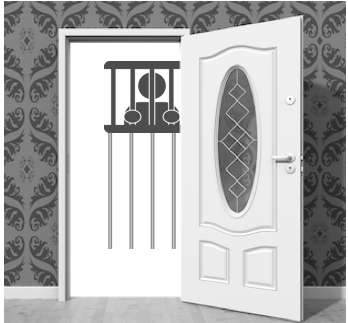
Opening the door this Passover [INVITATION]
. ..calls Jews outside to provide for the physical and spiritual needs of those on the inside (if possible, before launching our own celebrations). But needs persist, so it’s never a bad time to begin addressing them.
[EXILE and ACCESS]
..calls Jews outside to consider our history with various everyday languages, like Aramaic, and Hebrew, the language of sacred text and prayer, and to reflect more widely on our language choices, surveillance, and the interaction of the two.
. ..calls Jews to examine what is available, from their own and other movements and educational organizations, to Jews inside and what assumptions — about who is a Jew and what a Jew does — are made.
…calls Jews to build connections and mutuality.
[NEXT YEAR]
. ..reminds us that human trafficking worldwide, “incentive
pay” of pennies per hour in Canada, and the “exception clause”
to involuntary servitude in the U.S. mean that, in very real ways:
Now we are slaves. Next year, we will be free.…reminds us that incarceration creates hunger,
all sorts of need, and disconnection from home
and calls us to respond, for those still inside and
for those engaged in re-entry/reintegration.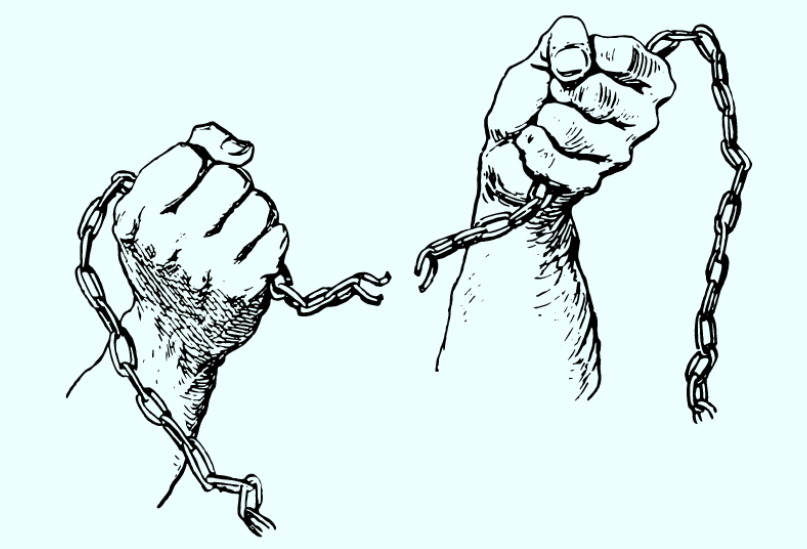
….next year, free! - Ending Solitary: Updates and Action Links
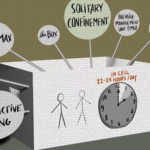
Matir Asurim endorsed the US “End Solitary Confinement Act” and urges other Jewish institutions and organizations to get behind the work of ending solitary and advocating for prison justice more broadly. See statement and additional background.
Solitary Confinement in Canada
Learning from the study of the Government of Canada’s apparent attempt to end solitary confinement: The “Structured Intervention Units” in Correctional Service Canada institutions
Event Announcement: When Parliament created “Structured Intervention Units” in 2019, Correctional Service Canada (CSC) took the position that the new legislation had abolished Administrative Segregation and they no longer practiced solitary confinement. Four years later, it is clear that the term Administration Segregation is no longer part of the official toolbox for CSC, but the practice of solitary confinement is alive and well in Canada’s penitentiaries. After over four years of examining Canada’s approach to solitary confinement, it is clear that there are two separate, but related topics that can be examined. The first is straightforward. It involves the understanding of what is happening in Canada’s penitentiaries in the area normally referred to as solitary confinement. The second is more complex. It involves using the study of “Structured Intervention Units” as a tool for understanding how Correctional Service Canada operates its institutions for all prisoners.
Anthony N. Doob, professor emeritus at the Centre for Criminology and Sociolegal Studies at the University of Toronto, will explore this claim in his 2024 Distinguished Lecture of the Windsor Yearbook Access to Justice from 4 to 7 p.m. Thursday, Feb. 8, in the Don Rodzik Moot Court, Ron W. Ianni Faculty of Law Building.
Look for updates on related recording/report.
US Senate and House Updates
The US House of Representatives’ End Solitary Confinement Act gained one co-sponsor in recent weeks, bringing the total to 24 (out of 435). Track the House bill.
In late December, the Senate introduced its version of the End Solitary Confinement Act, which has five sponsors (out of 50). Track the Senate bill.
The New York City recently passed, by over-riding the mayor’s veto legislation banning solitary confinement in city jails. In 2021, the State of of New York passed legislation banning long-term use of solitary confinement in state facilities.
Municipal and state legislation has been introduced across the U.S. The Unlock the Box Campaign maintains a “Data-Tracker” with information on current and past bills.
Learn More, Take Action
The National Religious Campaign Against Torture (NRCAT) supports faith-based work across the U.S. on solitary confinement, among other issues. Here are some of their resources to use in worship and study settings.
“In keeping with our core belief that all people are made in the image of the divine and deserve to be treated as such,…”
#EndSolitary take action: nrcat.salsalabs.org/esca-2023

Interfaith Action for Human Rights supports faith-based attention to solitary confinement and other issues around incarceration, nationally and in the DC-Maryland-Virginia area. Bills are active in DC, MD, and VA at present. Check out and share their two-minute video “Reflecting on the Use of Solitary” —
image from video shows shoe box shape with stick figure and clock, “in a cell 22-23 hours a day,” and various names for Solitary Confinement: the Box, Supermax, Intensive Management Unit, Special Housing Unit, Restrictive Housing, Admin Segregation.
Unlock the Box provides works in coalition with NRCAT and provides additional tools for taking action on the federal and state levels in the U.S. For example, Unlock the Box urges reminders to President Joe Biden that he campaigned on ending solitary and has so far not fulfilled that promise.

“Dear President Biden: Keep the promises you made to the country and all those who are suffering at the hands of state-sponsored torture. End Solitary Now.”
Text over image of US flag and Pres. Biden
After the Legislation: Changing a law does not necessarily result in immediate or lasting changes in practice: see, e.g., the lawsuit filed in New York State, following passage of the HALT Solitary Act, and the work of Professor Doob and others in Canada. See also, a similar pattern regarding religious diet for incarcerated people.
- Nutrition and Religious Diet: Update and Request
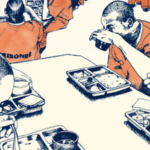
— by Virginia Avniel Spatz, volunteer researcher for Matir Asurim. posted 2024/2/4
Food justice for incarcerated people has been a long-standing problem, across the US and Canada, in federal, state/provincial, and local facilities. Kashrut adds another set of challenges, which have been the subject of litigation over many years and continue to affect incarcerated members of Matir Asurim. This report is one step in gathering resources about current food conditions, particularly for incarcerated individuals attempting to maintain kosher diet. These resources are intended to provide useful links for anyone working on prison food justice and to inform readers unfamiliar with the issues. Matir Asurim is still in the information gathering stage of network-wide work on this issue.
Additional data will be much appreciated. We need your help!
For those with direct experience of kosher eating while incarcerated or visiting incarcerated individuals, we can use your expertise! Have you or your organization succeeded in changing legislation or implementation around kosher food for one person, a facility, or a whole state/province? Please send personal experiences, legal details, and advocacy results to the author (ethreporter at gmail).
Caution: most of the reports cited below contain some disturbing details about food and its delivery (which may not mix well with meals or a queasy stomach).
Food Justice Reporting: General and Aramark-Specific
There has been substantial coverage on this issue in specialized news outlets, like Prison Legal News, and through more general sources, including The New York Times, Public Broadcasting System (US), and CBC/Radio-Canada. Independent organizations have been researching conditions: See, e.g., the 2020 Eating Behind Bars report from Impact Justice, the ACLU’s “Two Cups of Broth and Rotting Sandwiches,” and the 2023 “We’re Hungry in Here” from DC Greens/Don’t Mute My Health. In addition, there are scholarly approaches, for example: National Library of Medicine on prison nutrition (Canada) and on nutrition availability for those incarcerated (US), Studies in Social Justice “Unpacking the Prison Food Paradox” (Canada) and this global review.
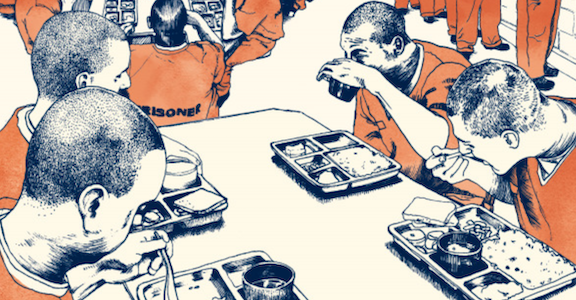
from Eating Behind Bars. image Credit: Melissa Garden. Description below. US reporting often focuses on complaints against Aramark, a private company which supplies food to institutions including prisons and colleges. Aramark has been fined, sued, and had contracts cancelled; but many carceral institutions have continuing and new contracts with Aramark. See, e.g., 2023 news report from Kansas City (Missouri), 2021 report from AFSC (American Friends [Quaker] Service Committee), and 2017 PBS News Hour (food focus follows prison labor section).
Reporting from/about Florida also focuses on Aramark, which took over food service within Florida Department of Corrections (FDOC) operations in 2022. (FDOC also had a contract with Aramark 2001-2006, and the FDOC’s cost-value analysis raised serious problems with the vendor.)
“Religious Diet” Litigation and Practice in the US
In the United States, “religious diet” — which includes meals for Jews, Muslims, Hindus, and others whose religious practice affects diet — is protected under the federal “Religious Land Use and Institutionalized Persons Act of 2000” (details here). Implementing this Act has not been straightforward.
Florida: Garbanzo beans and cold cereal
In one huge case, FDOC refused to supply religious diet as required by federal law, resulting in the United States suing the State of Florida. There were suits in 2002, 2012, and again more recently. Here are some documents providing important details: 2012 federal filing, a US Dept of Justice summary of the result Justice a post-appeal report (2015), plus a 2017 report on further appeals: “And then things got weird.” Meanwhile, a private religiously-focused law firm, which had filed amicus briefs in this case, trumpeted victory (2016) for religious freedom but had, in response to this reporter’s inquiry in late 2023, no information about if/how the ruling was actually being implemented and whether incarcerated people were receiving decent kosher meals.
At present, the religious diet is the same every day of the week, with no hot meal provided at all and insufficient calories. In addition, there are delivery issues with food arriving wet or in other inedible condition. There are limited kosher food options available through the commissary to supplement this meager fare, for those who can afford the price.
Who Decides Who Eats Kosher?
Back in 2012, Forward, reported on this Act and subsequent arguments in Jewish communities and beyond about who was entitled to kosher food. The article quotes leaders of Jewish institutions, including Aleph Institute and Jewish Prison Services International, who sought to decide who should be counted as a Jew for purposes of religious diet. In the last decade, policy-makers have taken a variety of approaches to accommodating kashrut needs of Messianic Jews and other groups. More recently, the ACLU filed suit (NOTE**) against the District of Columbia DOC focusing on the need for third-party certification that an individual is Jewish: delays and difficulties effectively deny kosher diets.
Who Decides What is Kosher?
Another area of challenge is the question of if/how kashrut is supervised. The State of California is not responsible for ensuring the kashrut of food distributed as to kosher-keeping incarcerated people, according to a recent ruling (NOTE**)
The State of New York recently passed legislation requiring halal and kosher options in commissaries and vending machines in state facilities. The bill provides for food that conforms “to the standards typically associated with the particular religious dietary requirements” and includes provisions for petitioning for foods that “conform to higher religious dietary standard.”
**Please note: these articles discuss crimes for which plaintiffs were convicted, which is entirely irrelevant to kashrut needs.
Religious Diet in Canadian Facilities
Further research on religious diets for those incarcerated in Canada is on-going. Here, meanwhile, are two related documents provided by a Matir Asurim chaplain:
Kosher dietary accommodations from Correctional Service of Canada. Religious Accommodation Handbook.
illustration above/feature image description:
Drawing shows cafeteria filled with men in prison jumpsuits; centered are four men at a table with trays of nondescript food. Image credit: Melissa Garden. Cropped from cover of Eating Behind Bars. Full citation for report: Soble, L., Stroud, K., & Weinstein, M. (2020). Eating Behind Bars: Ending the Hidden Punishment of Food in Prison. Impact Justice. impactjustice.org/impact/food-in-prison/#report
- End Solitary Confinement
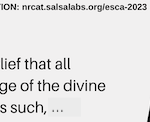
Matir Asurim members live and work in the US and Canada. Efforts to end solitary confinement are taking different paths in the two countries. MA recently endorsed a piece of federal legislation in the US and shares information about efforts in Canada.
US: End Solitary Confinement Act
STATEMENT TO SHARE
Matir Asurim: Jewish Care Network for Incarcerated People regularly encounters the physical, psychological, and spiritual devastation of solitary confinement. Our name, “Matir Asurim (literally: The One Who Frees Captives),” reflects Jewish values — including human dignity, healing, and teshuvah (repentance/restoration) — in opposition to solitary confinement. We applaud introduction of the End Solitary Confinement Act (HR 4972) in the US Congress, thank its co-sponsors, and encourage others to support this legislation and, more generally, an end to this form of torture wherever it is employed.We implore other Jewish institutions and organizations to get behind the work of ending solitary and advocating for prison justice more broadly.
LEARN MORE from NRCAT and the Topic Digest in Elul’s Divrei Matir Asurim.
and/orWRITE REPS For those in the US: Use this form to encourage your Representative to co-sponsor this bill or thank them for already doing so.
ENDORSE If your congregation or other organization would like to endorse HR 4972, use this form to sign on. Updated list of endorsers.
Canada: Isolation Persists
In November 2019, Canada announced abolition of administrative segregation. The shift from “solitary confinement” to “structured intervention units” did not substantially change the experience of extended isolation and its detrimental effects, according to this 2021 on the implementation of the SIUs from May, 2021. More recently, McGill Law School Journal offered this “[Counterpoint] Solitary Confinement in Canada, concerning “the history and evolution of solitary confinement, why its elimination has proved difficult, and the challenges of piecemeal versus system-wide change.”
This episode explores the practice of solitary confinement in Canada and the winding road toward its abolition. Our two guests, Andrea Monteiro (former Director of Corrections for the Yukon Government and founder of Ethical Correctional Consulting, Inc.) and Nora Demnati (a Montreal-based prison lawyer and instructor at McGill’s Faculty of Law) bring their differing experiences and perspectives to bear on the question of prison reform.
— podcast, with full transcript, June 27 2023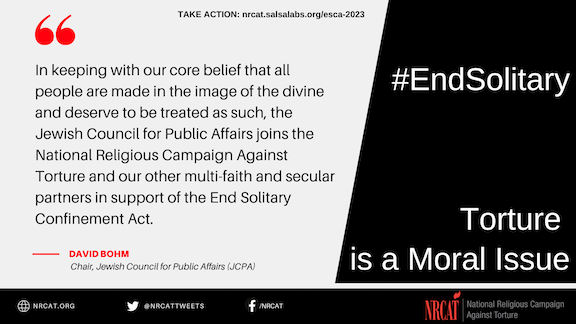
Alt Text for graphic: “In keeping with our core belief that all people are made in the image of the divine and deserve to be treated as such, the Jewish Council for Public Affairs joins the National Religious Campaign Against Torture and our other multi-faith and secular partners in support of the End Solitary Confinement Act. — David Bohm, Chair, Jewish Council for Public Affairs (JCPA)” Take action: nrcat.salsalabs.org/esca-2023. #EndSolitary Torture is a Moral Issue
- Responding to Extreme Heat Conditions
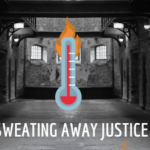
UPDATED July 11 and July 18
Matir Asurim learned, from inside Florida’s Death Row, that extreme heat conditions are endangering incarcerated people and staff alike. Even “normal” summer temperatures can be damaging to health without cooling measures. The aging UCI facility is not providing adequate cooling to protect the health of those inside. This document includes details about conditions and specific, urgent improvements needed. It also contains sample language for contacting those in power. Below are contacts and images for Florida’s #CoolTheRow campaign and some specific demands. An additional letter asks Jewish individuals and organizations to join the campaign.
Conditions are also deadly in Texas — inmates die in stifling Texas prisons (Texas Tribune, June 2023). And heat is an basic health issue in many locations during summer months. See report on prisons across US (Grist, March 2023) and “Few rules address extreme heat problems” (NPR, August 2022).
Please check on conditions of incarcerated people near you and conditions for Matir Asurim pen pals. Let us know of any other solidarity actions underway.
Short link to share this post — tinyurl.com/CoolRow
UPDATES
JEWISH VALUES call us to protect the vulnerable, advocate for justice, and safeguard the sanctity of human life.
Cool the Row crafted a letter reflecting Jewish values to encourage greater participation in this campaign. Please edit this DRAFT to suit and share with Jews and Jewish organizations.
SERIOUS ATTENTION needed. Early responses from Fl DOC officials reported regular visits to UCI and “no complaints” concerning heat on the same days that inmates reported oppressive heat affecting health and well-being. They also reported addition of a fan in the day room — which is progress of a kind but, per reports from inside, pops the electrical circuit, cutting power to smaller fans in nearby individual cells. Attention to the basic safety of staff, National Guards, and inmates requires serious attention and consultation with all concerned. Any heat measurements must include some taken at the hottest part of the day, and explore conditions in cells and public spaces.
As of July 18, conditions were still dangerously hot and contributing to lack of sleep, which has additional consequences for physical health and mental well-being. Immediate cooling measures and plans for longer-term solutions are still needed.
Florida #CoolTheRow Action
Here are specific demands to raise with Florida Department of Corrections:
- Repair the defective shading devices in the yards to provide adequate relief from the sun and reduce the risk of heat-related illnesses.
- Implement temporary relief measures, such as daily distribution of ice to inmates, which can help alleviate the extreme temperatures within their cells. Simple and cost-effective solutions, such as placing frozen water bottles in front of fans, could provide some immediate relief while awaiting long-term solutions.
- Consider involving the Death Row population in the pilot program currently installed at Lowell Correctional Institution, utilizing portable AC Units (Swamp coolers) to regulate the extreme temperatures. The families of the inmates are willing to contribute financially towards the installation of such devices, and numerous organizations fighting against the death penalty will support this initiative.
Here are FL DOC officials to contact. See sample letter regarding extreme heat for more background.
The #CoolTheRow campaign also shared contacts for Florida Legislators. Campaign organizers believe these legislators are concerned about prison justice and willing to hear from people who are not their constituents.
Facebook sample messages:
 Let’s stand together to #CoolTheRow! Share this powerful visual and join the movement for justice and compassion on Florida’s Death Row. Together, we can make a difference!
Let’s stand together to #CoolTheRow! Share this powerful visual and join the movement for justice and compassion on Florida’s Death Row. Together, we can make a difference! 
 #CoolTheRow
#CoolTheRow Time to take action! Spread the message far and wide. Share this impactful image and let’s demand change for those facing extreme heat on Florida’s Death Row. #CoolTheRow
Time to take action! Spread the message far and wide. Share this impactful image and let’s demand change for those facing extreme heat on Florida’s Death Row. #CoolTheRow Heat doesn’t discriminate. Inmates, correctional officers, and National Guards are all at risk. Share this visual, raise awareness, and fight for safer conditions. Join the #CoolTheRow campaign now!
Heat doesn’t discriminate. Inmates, correctional officers, and National Guards are all at risk. Share this visual, raise awareness, and fight for safer conditions. Join the #CoolTheRow campaign now!Twitter sample messages:
 Join the movement, save lives! Let’s #CoolTheRow in Florida’s Death Row! Share this powerful image and demand action for those at risk of lethal heat. Together, we can make a difference!
Join the movement, save lives! Let’s #CoolTheRow in Florida’s Death Row! Share this powerful image and demand action for those at risk of lethal heat. Together, we can make a difference! 

 It’s time to raise our voices! Share this impactful visual and let’s stand up for justice on Florida’s Death Row. Heat is lethal, and we must fight for change. #CoolTheRow
It’s time to raise our voices! Share this impactful visual and let’s stand up for justice on Florida’s Death Row. Heat is lethal, and we must fight for change. #CoolTheRow No one should suffer in the scorching heat, not inmates, not correctional officers, not National Guards. Spread this image, raise awareness, and join the #CoolTheRow campaign for a safer future.
No one should suffer in the scorching heat, not inmates, not correctional officers, not National Guards. Spread this image, raise awareness, and join the #CoolTheRow campaign for a safer future.
Images to use on social media:
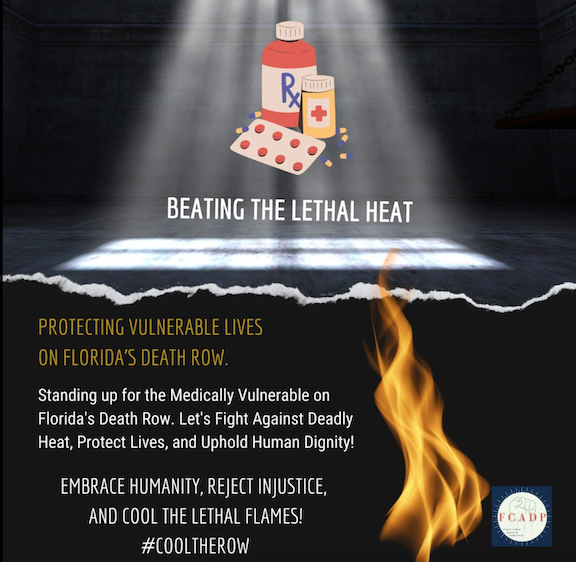
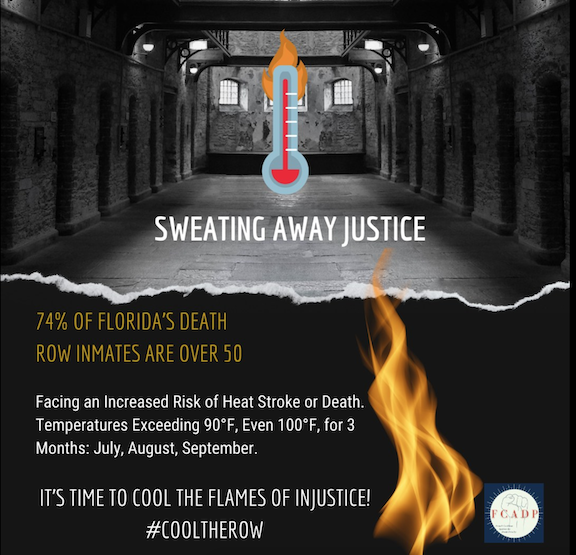

Alt Text for images:
CoolTheRow#3: Prescription bottles and pills with words: “Beating the Lethal Heat — Protecting vulnerable lives on Florida’s death row. Standing up for the Medically Vulnerable on Florida’s Death row. Let’s fight against deadly death, protect lives, and uphold human dignity! Embrace humanity, reject injustice, and cool the lethal flames!” #CoolTheRow
CoolTheRow#4: Image of prison cells with thermometer and “Sweating Away Justice” 74% of Florida’s death row inmates are over 50. Facing an increased risk of heat stroke or death. Temperatures exceeding 90 F, even 100 F, for 3 months: July, August, September. It’s time to cool the flames of injustice! #CoolTheRow
CoolTheRow: Image of sweaty face with thermometer and “Saving lives, fighting heat.” Protect Florida’s death row inmatesI Protect Florida’s death row inmates. With over 90 F, even 100 F, scorching summers lasting three month, we must act now. Reduce the heat, preserve human dignity! #CoolTheRow
- Meeting and Team News

Check out this month’s organizational news in the Tammuz edition of Dirvrei Matir Asurim. Read on-line and/or download the whole edition in formatted version or straight text.
Special topic, from June 14 General Meeting: Jews and the Death Penalty.
Please share with inside members:
These reports on general meetings and teams/working groups provide inside members, and others who are unable to attend meetings, summaries of happenings within Matir Asurim. We will also share inside members’ responses. Please forward to inside pen pals.
A few key items this month for outside members:
Penpal Community Hour on Zoom. On Sunday, July 16th from 6-7pm EST, we will offer a monthly Penpal Community Hour on Zoom for those with incarcerated penpals. Please register here.
Reimbursements: We are excited to share that we are able to reimburse Matir Asurim penpals for postage expenses spent on penpals. Details here.
Shutim (“Questions and Answers”): Shutim is a new column in Matir Asurim mailings that responds to questions that folks inside are asking about how to do Jewish practices while incarcerated. Use this form to submit questions. Or send questions to: Matir Asurim. PO Box 18858, Philadelphia, PA 19119.
Seeking interviewees for Prison Chaplaincy Oral History Project!
Shir, one of our Matir Asurim organizers, is collecting stories from prison chaplains (paid or volunteer) across faith traditions. They are interested in learning how people came to prison chaplaincy, how they understand “spiritual resilience” in the context of prison chaplaincy, and how they see their role as prison chaplains fitting into wider conversations about abolition. Please share information with chaplains who might be interested — details and form.
- Fringes, Still in the Wilderness

New this month in Torah Explorations:
“Still in the Wilderness” — some thoughts on holiness, crowds, and grumbling (Numbers 8 – 18).
“What Will We Make Different this Year?” by Jay Stanton, plus more thoughts on “fringes.”
READ AND SHARE Divrei Matir Asurim [Matir Asurim Words/Matter]: Follow the links above to read on-line, and/or download the whole Tammuz edition in formatted version or straight text.
CREATE AND SHARE: Divrei Matir Asurim is also seeking material for future Torah Explorations. We welcome thoughts on Torah text, practice and prayer, and other reflections relating to Matir Asurim’s work.
General guidelines:
We know that our incarcerated community members have powerful Torah to offer us, and we know that abolition must be and will be led by those directly impacted by prisons – which is to say that this is not a charity project. This is a strategy of care. We are creating these resources as points of connection and as a way to build a spiritual practice with our expansive Jewish community.
Submissions should be accessible – avoid academic language, jargon, acronyms, define all Hebrew, Yiddish, Ladino or non-English words. When creating content, there is a balance between writing from your heart while also being aware of the power dynamics between inside/outside community members. We ask that everyone who is contributing (especially those who do not have direct experience with the prison system) be mindful of their unique positionality while creating content.
If you have questions or material to share, contact the editor: ethreporter at gmail.com
- Numbers, Wilderness, Sinai

Torah Explorations
“Matir Asurim Torah Explorations” is part of the new Divrei Matir Asurim: Matir Asurim Words/Matters publication, an experiment from Matir Asurim. The experiment begins with the Book of Numbers.
Introduction: The Book of Numbers
Bamidbar: In the Wilderness
Naso: Take a Census, Lift Up
Please read. Discuss. Share.
For those who prefer formatted PDF or unformatted text to share, below are additional ways to access the same “Torah Explorations.”
Shavuot Resources
For the festival of Shavuot, (re-)explore the 5782 Shavuot mailing. Poems, essays, and other resources to help celebrate the giving of the Torah. Shavuot begins at nightfall on May 25 this year.
Download from the resources page.

- General Meeting, Team News, and more

Matir Asurim is experimenting with expanding communications, to make our work and our hopes and our plans easier to access for all interested, and to make input from folks inside and outside easier to incorporate in our decision-making. This Late May edition of the brand new “Divrei Matir Asurim: Matir Asurim Words/Matters” includes summaries of recent general and team meetings. Also new as part of the communication experiment is “Matir Asurim Torah Explorations.”
Please check out the new offerings and let us know what works, what more/different you’d like to see, and what you’d like to contribute yourself.
Here is the first edition of Divrei Matir Asurim: Matir Asurim Words/Matters, on-line.
Here is a formatted newsletter version (PDF) and an unformatted/text version.
- Matir Asurim in Jewish Currents

Matir Asurim was highlighted in a “Jewish Currents” publication earlier this year. Author Aviva Stahl notes lack of attention to “lived experience of incarcerated Jews…even within the most progressive Jewish communities.” She describes long-standing resources for (some) incarcerated Jews, adding that “queer and trans people or people of color…struggled to find any resources to support their religious life.” The article relates some individual experiences as well as the genesis of Matir Asurim and current initiatives:
…a chaplaincy network that provides resources and support to incarcerated members, a pen pal program, a holiday mailer that includes contributions from incarcerated and non-incarcerated writers, and public education programming for people on the outside to learn more about abolitionism through a Jewish lens. The organization now sends out around 75 holiday mailers to incarcerated people across the US and Canada and has matched nearly 40 pairs of pen pals….
Stahl, “Jewish Currents Thursday Newsletter, 2/23/23Stahl notes Shir Lovett-Graff’s view that “centering people who are incarcerated can change our perception of who is Jewish and who is interested in Judaism,” and cites Jessica Rosenberg suggesting that “these resources haven’t existed in the past in part because most white Jewish communities typically don’t see themselves as connected to the issue of incarceration.”
Full story at Jewish Currents
Image Description: “Thursday Newsletter 2/23/2023” over image of flying bird with “Matir Asurim” in Hebrew characters and “Jewish Care Network for Incarcerated People” in English.
Image courtesy of Matir Asurim, as part of Jewish Currents report.
- New Member Orientation – January 29th

If you’re in creating Jewish communities across and beyond prison walls, resourcing and supporting incarcerated Jews, and organizing for a world without prisons, join Matir Asurim for a new member orientation, to find out about our work and organizing model, and how you can get involved.
We will have live captioning at this meeting. Please let us know any access needs, and we will do our best to meet them.
- December Penpal Training

Join Matir Asurim on Sunday December 11 at 5pm EST/2pm PST for a penpal training!
This session will include information about our guiding principles, structure, and some reflection time on penpal relationships.
- Jewish Traditions & Futures of Mutual Aid: A Conversation with Dean Spade and Dori Midnight — 11/20

Jewish history and tradition is full of practices of mutual aid that sustained our ancestors, and must be part of our work to transform the world and towards abolition. Join Dean Spade and Dori Midnight in conversation about ritual and magic, collective care and mutual aid organizing, where our ancestors have been and how their wisdom can propel us into a world without walls.
- Rosh Hashanah Letter-Writing – Sept. 18th 2022
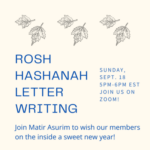
Join Matir Asurim to wish our members on the inside a sweet new year! Sunday, Sept. 18th at 5pm EST
Registration Link: https://us02web.zoom.us/meeting/register/tZwvcuigrjMrHtJH2T5xcyStMCRQHbu-srbi
- June Penpal Training – 6/26 – 10-11:30AM PDT

We are holding our next penpal training and introduction to our penpal program, which connects penpals from the outside (non-incarcerated) with folks on the inside (incarcerated). The training will include info about our guiding principles, structure, logistics, and some reflection time on penpal relationships.
This session will be on Sunday June 26th from 10-11:30 PDT / 1-2:30 ET
Current penpals are also invited to lead a ritual, opening, or song, or sharing about their experience being a penpal during this meeting. If interested, please email us by Tuesday June 21st.
- Introductions to Abolition with Matir Asurim – 6/5/22 – 12:00PM EDT

This Shavuot, join organizers, volunteers, and supporters of Matir Asurim: Jewish Care Network for Incarcerated People, as we deepen our learning about abolition.
Together with Enzi Tanner and Alona Weimer, we will explore the basics of abolition, engage questions like what does abolition mean to us, and discuss how we can connect our abolition with our Jewishness, spirituality, tradition and culture.
